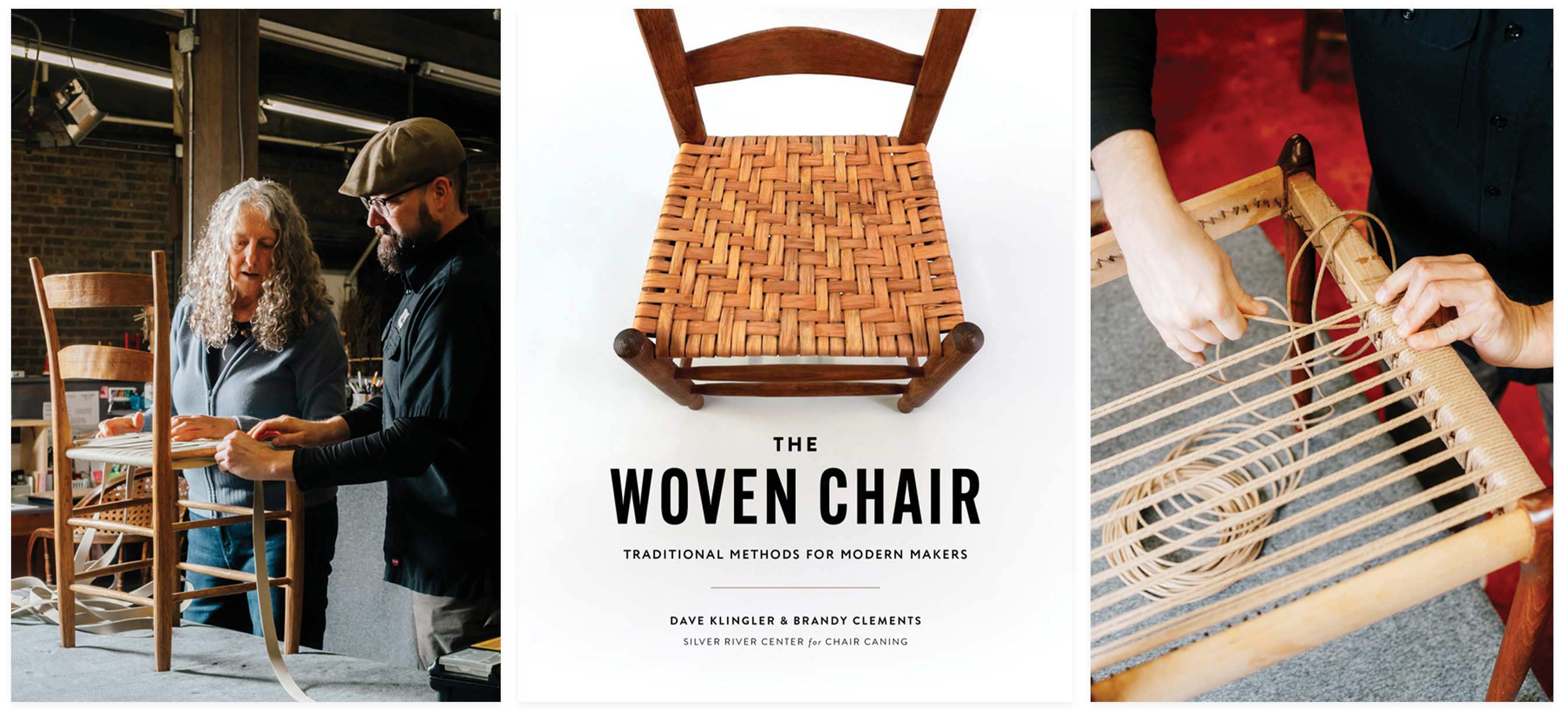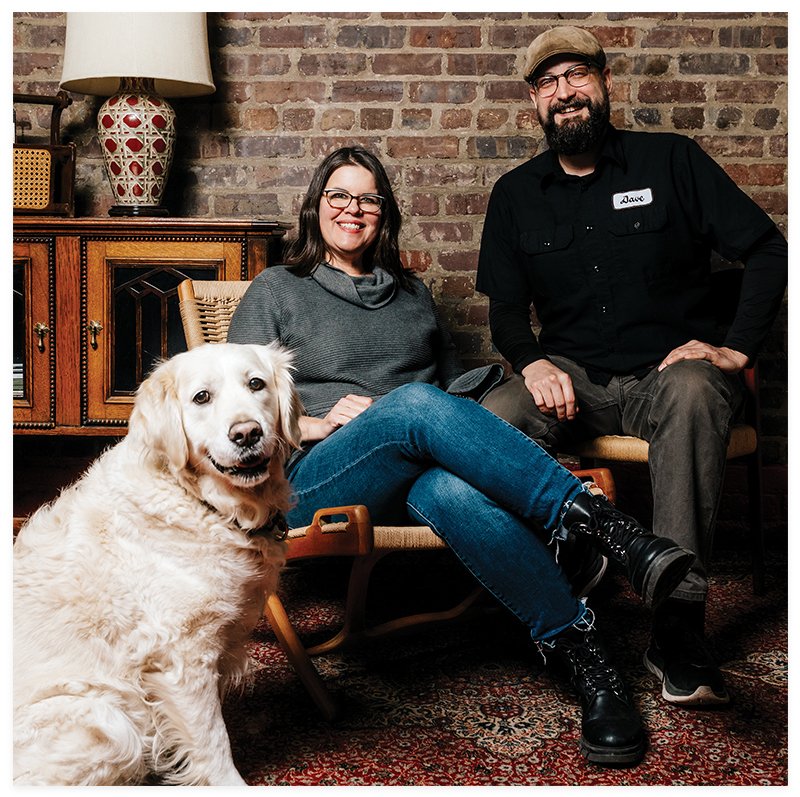A Weaving Tradition
A Weaving Tradition: The owners of Silver River Chairs and their work preserving and teaching the art of chair caning
Asheville’s River Arts District is home to many artist studios, breweries, coffee shops, and other modern, urban experiences, including the nation’s only chair caning school and museum, Silver River Center for Chair Caning. Here, husband and wife duo Dave Klingler and Brandy Clements teach online and in-person classes, lead tours through sections of preserved caned chairs, and work on individual projects.
Caned furniture features durable, woven strips of rattan bark on its seat or back. Its patterns are often intricate—and when done by hand, quite labor-intensive, but well worth the work. Even with modern technology, machines can’t fully recreate the caning techniques. Because of Clements’s and Klingler’s efforts, the Western North Carolina—and global—tradition is being passed down to the next generation.
ALL IN THE FAMILY
Silver River Chairs is a homage to Clements’s father, she explains. “He died right after I learned, and so it’s like a tribute to him. It was the last thing he suggested I do with my life.” Clements is a fourth-generation chair caner, and learned the weaving style from her aunt Linda, who learned from her parents and grandparents. She first began caning in 2005 as a side job, but as business grew, so did her relationship with Klingler.
Klingler and Clements first met on Folly Beach, just outside of Charleston, SC. Klingler has always had a passion for woodworking, and while in the Lowcountry, Clements roped Klingler into collaborating on a project with her, and the pair have continued working together since. “We took the deep dive, or the big leap of faith, in 2010 when we opened the first shop, and then it became full time for both of us,” Klingler explains. At first, Silver River Chairs mostly worked on crafting, repairing, and restoring older caned furniture, but in the last few years, they’ve focused more selective restorations and teaching the art of chair caning to anyone who is interested. “We didn’t anticipate it being what it is now, and having people come from all over the world to take classes with us,” says Clements.
A GLOBAL TRADITION
Certainly, caned chairs seem Appalachian—after all, using natural materials to make something not only practical but beautiful is the essence of our region’s culture and history. However, chair caning is an ancient, global art that can be found in many cultures and time periods dating back thousands of years.
“What we like to say is it’s like music,” Clements expands. “For example, there’s Appalachian music. But the banjo, which is heavily involved in Appalachian music, came from Africa. Similarly with chair caning and chair seat weaving, it all comes from ancient culture, whether it’s ancient China or Egypt. It comes from all over . . . It is practiced in Appalachia, but there’s nothing specifically Appalachian about it.” In fact, in the 1700s, when mountain residents were weaving rattan chairs, the material they used was imported from southeast Asia.

(Left to right) Klingler works with student Alice Oglesby on a woven seat; Dave Klingler and Brandy Clement's first book, The Woven Chair; Caning is an intricate and labor-intensive process, as Klingler demonstrates.
But like so many other global traditions, our region has put its own touches on the practice. Native Americans used hickory bark and rivercane to weave mats and baskets, and several families that had relocated from Europe brought their techniques to Western North Carolina. “As Appalachians, we’ve put our own spin on things, but it’s not that different from what someone was doing in England,” says Klingler. The Mace family—legendary Madison County chairmakers in their own right—used corn shuck as weaving material. Richard Poyner, an enslaved Black man in Tennessee, made caned chairs, and eventually earned enough to buy his freedom in the 1850s. Some of Poyner’s creations, along with the works of other furniture makers, are on display until July 13 at the Center for Craft in Asheville.
One part of Clements’s and Klingler’s operation is their museum, which honors the rich history of the craft. Surrounding their workspace are sections of caned seating from around the country, some old and some new. After stumbling onto the traveling exhibit “The Art of Seating” in 2014, which is currently on display at the Mint Museum in Charlotte, the couple was inspired to start their own collection. Along the far end of the studio is the chair wall, a row of seating that highlights eight basic materials that are used for weaving, their variations, and the history and process of each style. The museum also represents the work of Western North Carolina artists, “which contains, a lot of the Mace family chairs, as well as some chairs that were owned by the Postmaster General of Luck, North Carolina—his great-granddaughter donated his chair—and we’ve got chairs that were original to the S&W cafeteria in downtown Asheville,” says Clements.
LOOKING AHEAD
Clements and Klingler are self-proclaimed “chair nerds,” which makes sense given their passion for education and their wealth of knowledge on such a niche subject. During the COVID-19 pandemic, Silver River Chairs faced tremendous difficulty, like so many other small businesses. After hitting their groove in 2019, they had to pivot their strategy in order to accommodate a new normal, which led to the development of their Youtube channel where Clements and Klingler share instructional videos. The caners also provide one-on-one instruction via Zoom for people living outside of the area; their brick-and-mortar at CURVE studios & garden hosts in-person and virtual lessons for folks of all ages.
For the last year, Klingler and Clements dedicated themselves to expanding their educational tools. This spring, they release their first book, The Woven Chair, an instruction manual for seat weaving in many forms, with a second one on the way. “We had a lot to say and we wanted to get it all down, and even so, we tried to make things as succinct as possible,” Klingler says. The Woven Chair not only shares DIY steps and design tips, but also the history and theory behind popular patterns like rush and shaker tape. A second instructional book will be released later this year. Alongside their book, Silver River Chairs is revitalizing their biannual boot camp, which happens every spring and fall. During this two week program, caners at any level can learn the basics and get to know the craft.
Clements and Klingler are in their Asheville studio most days. Many of their students have gone on to open their own successful businesses; because of Clements and Klingler’s dedication, chair caning has continued to grow in Western North Carolina for another generation.
Silver River Chairs
#5 River Arts Pl., Ste. 201, Asheville
Monday-Friday 11 a.m.-4 p.m., by appointment only; (828) 707-4553 silverriverchairs.com
